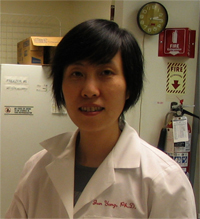Breadcrumb

Jun Yang, PhD, an assistant professor of ophthalmology and visual sciences at the University of Utah School of Medicine and researcher at the John. A. Moran Eye Center, is committed to studying the molecular mechanisms underlying hereditary retinal degenration and hearing loss.
At the annual meeting of the Association for Research in Vision and Ophthalmology in Orlando, Florida, she spoke to colleagues about her study on PDZD7 (a modifier gene) in the mouse retina, research she completed with fellow University of Utah researchers Junhuang Zou and Tihua Zheng.
In a Q&A with Health Feed, she outlines her latest findings:
Q: Tell us about your study on PDZD7 in the mouse retina.
A: PDZD7 was recently identified as a modifier gene for Usher syndrome, a disease characterized by combined retinal degeneration and hearing loss. This gene was also found to be able to contribute with other Usher genes to digenic form of Usher syndrome.
The recent study in my lab demonstrates that PDZD7 is involved in the formation of a protein complex in hair cells. This protein complex consists of the proteins encoded by the causative genes of Usher syndrome type 2, the most common clinical type of Usher syndrome.
Our finding of PDZD7 in hair cells suggests that it may play a similar role in photoreceptors, the target cell in the retina of Usher patients.
As our presentation at ARVO demonstrates, we found that PDZD7 expresses differently in photoreceptors, compared to hair cells. Additionally, loss of PDZD7 does not affect the localization of the proteincomplex composed of the same proteins as in hair cells. Therefore, we've concluded that PDZD7 may function differently in photoreceptors and hair cells.
Q: How might your recent discoveries impact the future of vision health?
A: We provide the evidence that the protein complex composed of the Usher syndrome type 2 proteins is not exactly the same in photoreceptors and hair cells. The mechanisms underlying retinal degeneration and hearing loss due to defects in this protein complex may also be slightly different. We believe our study will help understand the disease mechanism of Usher syndrome type 2 and may helpfuture development of treatments.
Q: What's next for you on the research front?
A: We will further investigate the function of PDZD7 in the retina using our PDZD7 knockout mice.